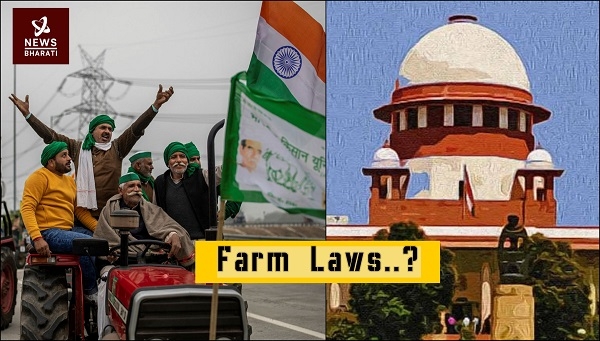Farm Laws: Petition filed in SC for implementation of 'Farm Laws'
Total Views |
New Delhi, Jan 22: An Aligarh-based company has stepped forward in support of the three farm laws and has approached the Supreme Court for their implementation. The Ramway Foods Limited's Director through his lawyer, Dhananjay K Garg has filed a petition in the Supreme Court of India in support of the agriculture laws. According to the plea, the prevailing system and the non implementation of the farm laws is causing difficulties for the petitioners.

The petitioner has also suggested for a direction from the Apex Court for a representation in the Committee as a panel member that the SC constituted on Jan 12 to deal with the issue, putting forth the fact that the company remains to be one of the major stakeholder. According to the recent developments in the 'Agriculture laws' issue, the SC on Jan 12 suspended the implementation of the three farm laws temporarily, in order to first bring the farmers agitating against the laws to the negotiating table. The SC has also set up a four-member expert committee primarily to negotiate between the farmers and the govt. The three-judge bench led by CJI SA Bobde informed on Jan 12 that “Negotiations between the farmers’ bodies and the govt had not yielded any results so far.” Besides the farmers' bodies who are publicly against the agricultural reforms have been highly reluctant of any possibility for negotiation and have said they won't appear before the committee.
In such circumstances, now a petition has been filed in the SC in support of the implementation of the new farm laws, on the grounds of practical challenges faced by the petitioner company. The plea was filed before the Apex Court under Article 32 of the Constitution of India by the petitioner, who is running Roller Flour Mills in Uttar Pradesh's Aligarh. The petitioner moved the Apex Court for the enforcement of its fundamental rights guaranteed under Articles 19 (1) (g) and 21 of the Constitution of India.
According to the Article 32, the SC shall have power to issue directions or orders or writs, including writs in the nature of habeas corpus, mandamus, prohibition, quo warranto and certiorari, whichever may be appropriate, for the enforcement of any of the rights conferred by Part III of the Indian constitution. The article provides and guarantees the Indian citizens with the right to move the Supreme Court by appropriate proceedings for the enforcement of the rights.
Also read: India-Uzbekistan cooperation in Solar sector gets 'a final go'
Article 19 of the Indian Constitution deals with the protection of certain rights regarding freedom of speech and expression. According to Article 19 (1) (g), all citizens of India shall have the right to practice any profession, or to carry out any occupation, trade or business. Article 21 of the Indian constitution guarantees the fact that no person shall be deprived of his life or personal liberty except according to procedure established by law.

